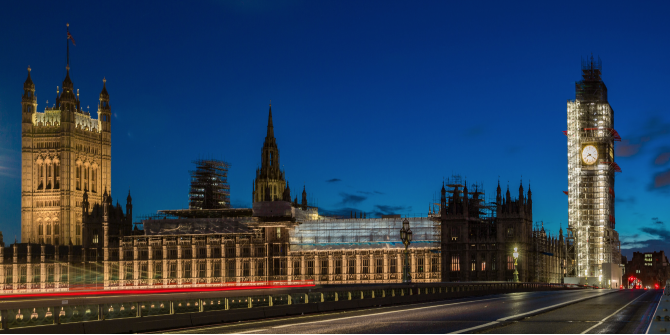
 Daniel Wincott and Gregory Davies discuss the development of the ‘Anglo-British’ imaginary, particularly when it comes to constitutional interpretation, and discuss some of its implications. They write that when judges, lawyers and politicians offer an Anglo-British image of the UK, they tend to blur and obscure English, British and UK realities, while marginalising Northern Ireland, Scotland, and Wales.
Daniel Wincott and Gregory Davies discuss the development of the ‘Anglo-British’ imaginary, particularly when it comes to constitutional interpretation, and discuss some of its implications. They write that when judges, lawyers and politicians offer an Anglo-British image of the UK, they tend to blur and obscure English, British and UK realities, while marginalising Northern Ireland, Scotland, and Wales.
There is ‘a great risk of eliding or confusing the UK with England’: so said Lord Neuberger, then President of the UK Supreme Court, in February 2014. More than just a risk, the elision ‘is inevitable’, Neuberger argued, ‘not least because England represents over 85% of the UK’s population’. While offering some reflection on it, Neuberger’s lecture also exemplified the tendency he observed. ‘Since 1066’, he said, ‘the UK has never been successfully invaded by a foreign power’. Such remarks typify what we call the Anglo-British imaginary. This highly stylised, Anglo-centric history has a pervasive influence in mainstream legal-constitutional discourse. It reflects and reproduces an idea of ‘the nation’ as a particular, if imprecisely specified, imagined territorial community. Though distinct from it, the Anglo-British imaginary resonates with the ‘old’ constitution, discussed recently by Aileen McHarg and Alison Young. Both project images of an exceptional nation. Reinvigorated by Brexit, the implications of this imaginary for the practice of government in England and across the UK state’s other nations and jurisdictions need to be carefully unpacked.
Our conception of the Anglo-British imaginary developed from analyses of the UK and devolved governments’ responses to Brexit, the territorial print media’s treatment of Brexit litigation, proposals for reform of the territorial constitution and analysis of the ‘textbook tradition’ in English constitutional law. It encompasses a set of Anglo-centric treatments of, and assumptions about Britain and the UK. This partial and highly stylised history is hardly unique: nationalisms across the world are rooted in strikingly selective genesis narratives. Even so, the imagined Anglo-British nation’s foundational territorial ambiguity – rooted in an elision of England, Britain and the UK – makes it distinctive.
England’s relationship to Britain assumes an Anglo-British quality in various ways, among lawyers and judges as well as other commentators. Some attend to England – perhaps envisioned as a ‘sceptred isle’, or an ‘English state’. Others focus on Britain but understand it in Anglo-centric terms. At the level of public attitudes, English nationalism is emphatically not a rejection of Britain, though its relationship to other parts of the UK can be hostile. In English constitutional legal discourse other nations are generally ignored unless they appear fleetingly as exceptions to Anglo-British norms or in historic accounts of their attachment to London’s metropolitan institutions. Anglo-centric British nationalism, meanwhile, regularly occludes England: a country of which Westminster politicians and Whitehall civil servants both find it difficult to speak.
The blurred conceptual relationship between Britain and the UK is rooted, partly, in an Anglo-British othering of Ireland. Again, Neuberger’s lecture exemplified this tendency. Since ‘the 13th century’, he argued, ‘there have been no changes to the countries of Great Britain’. He imagined the state as territorially stable by juxtaposing Great Britain with Ireland: ‘It is only across St George’s Channel, in Ireland, that there have been problems, but they have never seriously threatened the integrity of Great Britain’. Here, he cast Britain as the state’s core territory, from which Northern Ireland is excluded. After its creation in the 1920s, Northern Ireland’s devolved polity was easily forgotten in London. Anticipating the experience of Brexit, the border on the island of Ireland and arrangements across the Irish Sea – both built by bricolage – have been particularly poorly understood at Westminster and across Whitehall.
Whatever its form, imagined Anglo-Britain frequently obscures basic features of the UK, including its pluri-national character, its three long-standing territorial legal jurisdictions and its four legislatures. The UK’s uncodified constitutional arrangements, however, can look very different from other parts of the UK, especially to lawyers. In 2011, while Deputy President of the Supreme Court, Lord Hope declared that ‘times have changed since Dicey’, drawing on a ‘legal nationalism’ expounded in mid-20th century Scotland. Since devolution, something similar – Legal Wales – may be emerging west of Offa’s Dyke. Conventionally, however, these diverse facets of the UK territorial state are largely ignored, hidden by a constitution read through English Law and the singular notion of the Westminster Parliament’s sovereignty.
English academic lawyers have played a key role here. We lack a systematic official statement of the constitution’s content, scope and limits. Perhaps as a consequence, a ‘textbook tradition’ has been particularly prestigious in constitutional law. First published in 1885, A.V. Dicey’s Introduction to the Study of the Law of the Constitution is treated as an authoritative source for constitutional interpretation in the 21st century.
The early textbooks were written by English lawyers, within the English legal academy when the British Empire was in its full pomp. Written from an English perspective, they have little to say about the UK’s other territorial legal jurisdictions. In turn, legal principles and arrangements within those systems contributed little of significance to their accounts of the constitution. Instead, they addressed the expanding reach of England’s governing institutions across the islands of Britain and Ireland and through the global empire. Later, Ivor Jennings’ influential The Law and the Constitution, first published in 1933, discussed the British Constitution but English constitutional law. Meanwhile, ECS Wade and GG Phillips subtitled their 1931 text as ‘an outline of the law and practice of the constitution, including English local government, the constitutional relations of the British empire and the Church of England’. During the post-war period, legal academics became preoccupied with – and deeply engaged in – the British Empire’s formal unwinding. By the 1970s, the texts came to be presented as general treatments of Constitutional and Administrative Law or Public Law. Though today more often framed as British (or perhaps UK) rather than English, in most textbooks the constitution’s territorial reference remains ambiguous.
A few academic lawyers have embraced a notion of Anglo-Britain somewhat similar to our concept. Typically, these analyses identify the constitution itself as Anglo-British, but they point in opposite directions in other respects. Adam Tomkins has emphasized London’s historically dominant role in shaping the UK’s constitution. Thus, he argued, ‘it is not Anglo-centric to view the development of the British constitution from an Anglo-oriented perspective’. Ian Ward, by contrast, depicts the Anglo-British constitution as occluding and suppressing alternative constitutional perspectives that are specifically English and much more radical in character.
Whereas Tomkins and Ward call the constitution itself Anglo-British, we are more agnostic. Our view is that the UK’s constitutional arrangements remain ambiguous, notably in their territorial character and scope. Instead, our conception of the Anglo-British imaginary is neither restricted to nor primarily rooted in constitutional law. Grounded in a set of extra-legal notions and concepts, it revolves around a certain idea of ‘the nation’. The Anglo-British imaginary offers a background history and framework within which constitutional lawyers and judges set even putatively pure legal analyses. Some of their statements on the constitution are saturated by ideas about the nation and society, often presented as straightforward matters of historical fact. Yet, when judges, lawyers and politicians offer an Anglo-British image of the UK they tend to blur and obscure English, British and UK realities, while marginalising Northern Ireland, Scotland, and Wales. Unless properly understood and analysed, the Anglo-British imaginary stands in the way of any sensible debate about the future of the UK as a territorial state and the wider politics of these islands.
_________
Note: The above draws on the ESRC ‘Between two Unions’ project (ES/P009441/1). Daniel Wincott’s contribution was further supported by an ESRC Leadership Fellowship on Governance and Brexit (ES/R007500/1)
 Daniel Wincott is Blackwell Professor of Law and Society at Cardiff University and Director of the ESRC Governance after Brexit Programme, as well as Research Director at UK in a Changing Europe.
Daniel Wincott is Blackwell Professor of Law and Society at Cardiff University and Director of the ESRC Governance after Brexit Programme, as well as Research Director at UK in a Changing Europe.
 Gregory Davies is Lecturer in Law in the School of Law and Social Justice at the University of Liverpool.
Gregory Davies is Lecturer in Law in the School of Law and Social Justice at the University of Liverpool.
Photo by Andy Holmes on Unsplash.







